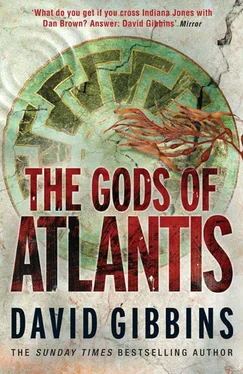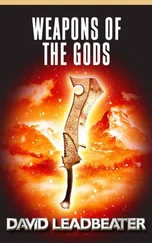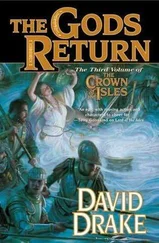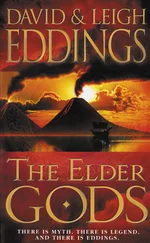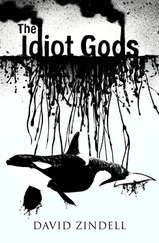David Gibbins - The Gods of Atlantis
Здесь есть возможность читать онлайн «David Gibbins - The Gods of Atlantis» весь текст электронной книги совершенно бесплатно (целиком полную версию без сокращений). В некоторых случаях можно слушать аудио, скачать через торрент в формате fb2 и присутствует краткое содержание. Жанр: Прочие приключения, на английском языке. Описание произведения, (предисловие) а так же отзывы посетителей доступны на портале библиотеки ЛибКат.
- Название:The Gods of Atlantis
- Автор:
- Жанр:
- Год:неизвестен
- ISBN:нет данных
- Рейтинг книги:3 / 5. Голосов: 1
-
Избранное:Добавить в избранное
- Отзывы:
-
Ваша оценка:
- 60
- 1
- 2
- 3
- 4
- 5
The Gods of Atlantis: краткое содержание, описание и аннотация
Предлагаем к чтению аннотацию, описание, краткое содержание или предисловие (зависит от того, что написал сам автор книги «The Gods of Atlantis»). Если вы не нашли необходимую информацию о книге — напишите в комментариях, мы постараемся отыскать её.
The Gods of Atlantis — читать онлайн бесплатно полную книгу (весь текст) целиком
Ниже представлен текст книги, разбитый по страницам. Система сохранения места последней прочитанной страницы, позволяет с удобством читать онлайн бесплатно книгу «The Gods of Atlantis», без необходимости каждый раз заново искать на чём Вы остановились. Поставьте закладку, и сможете в любой момент перейти на страницу, на которой закончили чтение.
Интервал:
Закладка:
‘That’s at Gobekli Tepe, about two hundred kilometres south of here on the Anatolian plateau,’ Jack said. He touched another thumbnail, and a similar image appeared showing a group of pillars arranged in rows within a chamber, sunk into the ground but rectilinear in shape. ‘And here’s Nevali Cori, the second site. There’s also another pillar with an arm, and a sculpture in the round showing a human head with a vulture on it.’
‘So this is why you were so excited when you saw that chamber today.’
‘It fits into a pattern. These are among the most extraordinary archaeological discoveries ever made.’
‘What’s the date?’ Costas asked.
‘That’s what makes these discoveries so earth-shattering. The Gobekli Tepe complex dates to at least 9000 BC. That’s eleven thousand years old. Before the first evidence for agriculture, before the first settled towns. Even before Jericho. This place was built by hunter-gatherers. They’re even calling this the world’s first temple, the Garden of Eden. But there’s something not right about that. Temples imply worship, and that’s a modern concept. Look at the vultures, the skulls. I don’t think anything was worshipped here. I think this was a place for ceremony, for ritual, but more like an access point to the spirit world.’
‘Like the idea of an axis mundi, a portal between hell and heaven.’
‘Except that our idea of the underworld, of hell, may be an invention of the developing religions after this period, something to frighten people into compliance. It’s from then on that priest-kings began to shape religion to their own purposes, invoking human-like gods that melded in the eyes of the people with the priest-kings themselves and were worshipped as one.’
Costas gestured at the pillars. ‘How long did this place last?’
‘That’s what’s so fascinating. Gobekli Tepe wasn’t transformed into a later religious complex. Some time around 8000 BC, it was deliberately buried. Thousands of years later, the same thing happens to henges and burial mounds in prehistoric Europe. In some places it may have to do with ancestor worship, with the idea that ancestors who were first venerated in these places had become too old and distant and needed to be parcelled away, to be buried to make way for the new. But I don’t think that provides the full explanation. I think we’re looking at the eclipsing of a whole belief system, one that was somehow still threatening enough for the new priests to order the destruction of the ancient ritual places, for those sites never to be used again. I believe the turning point came with the development of the first towns and cities, with the rise of priest-kings. They came at a time of new gods, gods that were beginning to emerge in the final period at sites like Gobekli Tepe when those pillars with the arms like humans were erected.’
‘And at Atlantis maybe the same thing was happening,’ Costas suggested, tapping a thumbnail to recall the underwater image from that morning. ‘This sanctum was once open-air, on the flank of the volcano. It was once a cave with paintings, but it looks as if all that old stuff was being upgraded, with those pillars and new carvings. At the end, there was only a small entranceway through a masonry wall, and then that was blocked off. Someone was trying to obliterate it.’
‘Exactly,’ Jack enthused. ‘And all of this involves planning and manpower, whether you’re creating the site or destroying it. It doesn’t take a race of supermen to build a complex like this one, but it does take plenty of toil and organization. If this was the Garden of Eden, it wasn’t a place to lie around in and eat apples. There was a lot of quarrying involved to make those pillars, using primitive stone and antler tools. They were free-standing monoliths: they’d been quarried and dragged into position. The biggest of them is thought to weigh at least twenty tons. Twenty tons. That was my point about the walls of Jericho. Hundreds of people were brought together to work on these monuments, persuaded by some authority to carry out back-breaking and dangerous labour.’
‘So how does the date fit with Atlantis?’
‘I think what we found today is really early, older than anything else. The cave paintings in that Atlantis sanctum are Palaeolithic, at least twelve thousand years old. And five years ago we found the other cave deep in the mountainside, the one we dubbed the Hall of the Ancestors, with organic paint pigments we radiocarbon-dated back at least thirty-five thousand years, as old as the earliest cave paintings anywhere in the world. This volcano was a site of religious significance way back into the Ice Age. Shamans must have come here from miles around to go deep inside the mountain and try to access the spirit world.’
Costas nodded again at the image. ‘So at the beginning of the Neolithic, say eleven thousand years ago, you’ve got a new group arriving?’
‘I’d suggest new ideas from within, even from the shamans themselves, a new generation perhaps who could see how the world around them was changing and wanted to maintain control over it. They were people with a new religious power they could impose on the local population. People with the drive and vision of the original settlers at the site, who could translate that energy in a different way. A group whose influence soon spread far and wide over Anatolia and the Fertile Crescent, to places like Gobekli Tepe and Catalhoyuk and Jericho.’
‘You said they had power over the local population, Jack. Is that how they built this place? Did they enslave the population?’
Jack pursed his lips. ‘It’s possible. Remember, the original people here were hunter-gatherers, the ones who found these caves and made the paintings. It’s even possible that organized agriculture was forced on them by the new priests as a way of having settled labour available to build religious monuments. That’s the kind of radical idea archaeologists started to play with when the temple at Gobekli Tepe was found, a temple older than the settlement around it, older even than the first evidence for agriculture. If we can pin that idea down, corroborate it, then Atlantis is an even bigger revelation than I could have imagined.’
‘So what’s going on at the time of the Black Sea flood?’
Jack paused. ‘When I was researching our discovery of Atlantis, I looked at all the original flood myths: the Greek myth of Deucalion, the Old Testament account of Noah, the ancient Mesopotamian epic of Gilgamesh. There was no doubt in my mind that they all originated from the same natural catastrophe, the sea-level rise at the end of the Ice Age, and more specifically the flooding of the Black Sea over the Bosporus in the sixth millennium BC. A date in the Neolithic is even hinted at in the stories. The account of Noah taking breeding pairs of animals matches what we know happened when early farmers spread from Anatolia to the islands of the Mediterranean such as Cyprus, where the excavations of Neolithic sites produce bones of animals that were not indigenous to the islands.’
‘You’re talking about domestic animals?’
Jack nodded. ‘Goats, sheep, cattle, tied down in longboats and rowed across from the mainland.’ He stared at the image of the carvings on the pillars, showing leopards and bulls. ‘But for this very early period, when animals were just beginning to be domesticated, we have to keep an open mind about that. Our focus is too often on finding an economic rationale: you take domestic animals with you because they provide food and clothing. But look at these carvings. You see bulls, yes, but are they bulls for food or bulls for ceremonies, to help shamans enter a spirit world? Were wild bulls first corralled and herded for that purpose? Did animal husbandry for food only arise later, after people had settled around these sacred sites and the corralling and breeding of animals acquired a new purpose?’
Читать дальшеИнтервал:
Закладка:
Похожие книги на «The Gods of Atlantis»
Представляем Вашему вниманию похожие книги на «The Gods of Atlantis» списком для выбора. Мы отобрали схожую по названию и смыслу литературу в надежде предоставить читателям больше вариантов отыскать новые, интересные, ещё непрочитанные произведения.
Обсуждение, отзывы о книге «The Gods of Atlantis» и просто собственные мнения читателей. Оставьте ваши комментарии, напишите, что Вы думаете о произведении, его смысле или главных героях. Укажите что конкретно понравилось, а что нет, и почему Вы так считаете.
